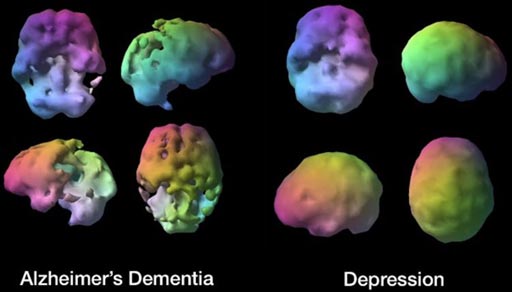Neuroimaging Helps Differentiate Dementia from Depression
By MedImaging International staff writers
Posted on 10 Mar 2017
A new study suggests that single photon emission computed tomography (SPECT) can help doctors discriminate between depression and cognitive disorders (CDs).Posted on 10 Mar 2017
Researchers at Amen Clinics, the University of California, San Francisco, and other institutions conducted a study involving 4,541 patients to evaluate if perfusion neuroimaging with brain SPECT can distinguish between persons with depression from those with CDs (Alzheimer’s disease, vascular dementia, dementia not otherwise specified, and amnestic disorders not otherwise specified), or both conditions.

Image: Representative brain SPECT scans in Alzheimer\'s dementia and depression (Photo courtesy of Amen Clinics).
Of the patients in the study, 847 were diagnosed with a CD, 3,269 were diagnosed with depression, and 425 suffered from both conditions. Using brain SPECT imaging, the researchers calculated perfusion differences between groups, using two-sampled t-tests corrected for multiple comparisons. Diagnostic separation was then determined with discriminant analysis, revealing predictive regions that could help delineate depression from CDs and comorbid cases. For example, the researchers found that people with CDs had lower cerebral perfusion in multiple areas compared to those with depression, particularly in the hippocampus, temporal, and parietal lobes.
In co-morbid persons, on the other hand, cerebral hypoperfusion was additive, showing lower regional cerebral blood flow compared to either diagnosis alone. They also found that SPECT could distinguish depression from CDs with 86% accuracy, and that brain SPECT imaging showed the ability to distinguish depression or dementia in people with both conditions with 83% accuracy. Feature selection identified the most predictive regions, which were the left hippocampus, right insula, cerebellar, and frontal lobe regions. The study was published on February 10, 2017, in Journal of Alzheimer's Disease.
“Cognitive impairment is present in approximately half of persons who have late onset depression, and depression is evident in 9-65% of individuals with dementia,” concluded lead author psychiatrist Daniel Amen, MD. “It is often challenging to diagnostically disentangle depression and cognitive disorders from one another. These disorders have very different prognoses and treatments, and being able to improve diagnostic accuracy can improve outcomes for some patients.”
Related Links:
Amen Clinics














